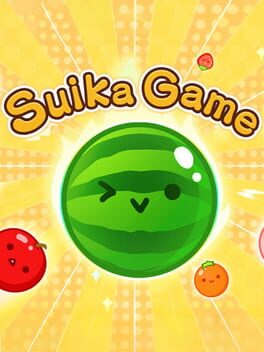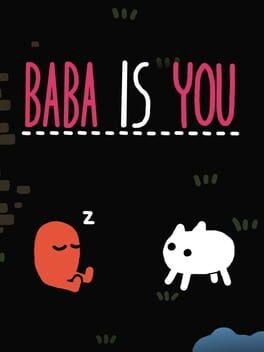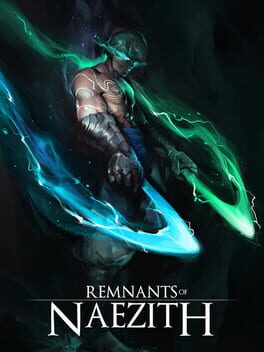patmeharder
14 reviews liked by patmeharder
Suika Game
2021
It’s rare that a video game gets a second shot at life. The three weeks after a title’s release is the critical window where most sales are made and the strongest impressions are left. After the proverbial ink dries on the pages of review sites (if you’re fortunate enough to get any) and the chatter dies down, sales gradually taper off to a slow trickle. Unless you’re Nintendo—whose games buck the trend and continue to sell year over year—your options are limited; you can release an update or tack on some DLC for a modest bump, but it only delays the inevitable. However, there’s one wild card that can occasionally bring a stagnant game back from the brink of death: social media trends.
Among Us is doubtless the most famous example; released in 2018 to little fanfare, the Mafia-style multiplayer game exploded in popularity at the start of the COVID-19 pandemic due to popular live streamers setting up games with friends. It was an organic moment in which the game’s appeal was demonstrated by regular people simply playing it and enjoying themselves, free of marketing campaigns, stilted tech demos, or money exchanging hands under the table. These days, with the increased prevalence of streaming, it’s not uncommon for games to get rolled up into the online ecosystem, extending the tail of their lifespan and keeping them in the public consciousness much longer. (This outcome is so desirable that some developers even try to court influencers with their game design choices.) Suika Game is the latest benefactor of these surprise viral trends.
The physics-based puzzler began life as a Chinese mobile game called Synthetic Watermelon (合成大西瓜), spreading through word of mouth via Weibo (China’s equivalent to Twitter) in early 2021. The premise is extremely simple: fruits fall from the top of the playing field, and combining two matching ones creates a larger fruit. Your goal is to continue combining fruit until you create the largest one (the watermelon, of course) while keeping your stack low enough so that it doesn’t spill over the top. The game became massively popular in China, but avoided crossing over to other countries due to the walled garden of Chinese app stores. (Searching Synthetic Watermelon or Suika Game on Western storefronts turns up a bunch of imitators, but don’t download them; they’re all terrible.) Synthetic Watermelon would eventually leapfrog over the Sea of Japan later in the year through an unlikely avenue: a high quality clone version by the company popInAladdin, developed for their line of home projectors as little more than a demonstration of the technology. The new remix on the Chinese mobile hit was modestly popular—enough that the company thought porting it to the Nintendo Switch as Suika Game (スイカゲーム) was a good business move—but it didn’t make waves right away.
Suika Game really started to blow up in 2023, circulating around the Japanese-speaking internet and eventually catching the attention of influencers. Popular livestreamer Futon-chan (布団ちゃん) played it on September 7th, describing it as “a game I often play in my bedroom.” From there, it shot to the moon; VTubers from Nijisanji and Hololive are streaming it for insane amounts of hours, and it’s currently the top selling game on Nintendo’s online storefront in Japan as of writing.
But what makes it such a good stream game? First of all, it’s easy to comprehend; you don’t have to observe for long before you’ve gotten a grasp on the gameplay loop. The goalposts can shift the moment you accomplish a milestone you’ve set for yourself, which keeps you playing for a long time. First, your goal might simply be to make one watermelon; then, you get fixated on making two; after that, you have to beat your high score. It’s also highly competitive, so people that love to backseat are instantly engaged and eager to prove they can put up better numbers. Most importantly, there’s an element of unpredictability. Suika Game is a matching-style puzzler, sort of like a Puyo Puyo or Drop Mania, but the fact that each piece of fruit has physics that affects every other one can lead to amusing and unfortunate consequences. Often, you’ll accidentally launch a tiny cherry off into space and immediately get owned. More opportunities for the player to suffer means more entertainment for the viewer—the popularity of Getting Over It with Bennett Foddy as a livestream game has proven this.
“Stream game” has become a sort of pejorative in certain circles, carrying with it the implication that it’s a better experience to watch than actually play. (These criticisms often get lobbed at things like the Five Nights at Freddy’s series or Tsugunohi—a game that a disingenuous person might describe as nothing but “walking to the left.”) Depending on your values, it might sometimes be the case that you’d rather be the observer than the person at the controls. There’s nothing wrong with that! What makes Suika Game great, though, is that it’s a good time no matter which side you’re on. I enjoy testing my fruit stacking abilities just as much as I do scrolling the game’s hashtag and observing random Twitter users succeed or fail at it. The game’s taken a hold on some of my friends, and it’s been a blast sharing scores and screenshots of my misery. To put it simply: Suika Game is a good stream game because, more generally, it’s a good social experience. It’s fun to share the moment with someone else.
Among Us is doubtless the most famous example; released in 2018 to little fanfare, the Mafia-style multiplayer game exploded in popularity at the start of the COVID-19 pandemic due to popular live streamers setting up games with friends. It was an organic moment in which the game’s appeal was demonstrated by regular people simply playing it and enjoying themselves, free of marketing campaigns, stilted tech demos, or money exchanging hands under the table. These days, with the increased prevalence of streaming, it’s not uncommon for games to get rolled up into the online ecosystem, extending the tail of their lifespan and keeping them in the public consciousness much longer. (This outcome is so desirable that some developers even try to court influencers with their game design choices.) Suika Game is the latest benefactor of these surprise viral trends.
The physics-based puzzler began life as a Chinese mobile game called Synthetic Watermelon (合成大西瓜), spreading through word of mouth via Weibo (China’s equivalent to Twitter) in early 2021. The premise is extremely simple: fruits fall from the top of the playing field, and combining two matching ones creates a larger fruit. Your goal is to continue combining fruit until you create the largest one (the watermelon, of course) while keeping your stack low enough so that it doesn’t spill over the top. The game became massively popular in China, but avoided crossing over to other countries due to the walled garden of Chinese app stores. (Searching Synthetic Watermelon or Suika Game on Western storefronts turns up a bunch of imitators, but don’t download them; they’re all terrible.) Synthetic Watermelon would eventually leapfrog over the Sea of Japan later in the year through an unlikely avenue: a high quality clone version by the company popInAladdin, developed for their line of home projectors as little more than a demonstration of the technology. The new remix on the Chinese mobile hit was modestly popular—enough that the company thought porting it to the Nintendo Switch as Suika Game (スイカゲーム) was a good business move—but it didn’t make waves right away.
Suika Game really started to blow up in 2023, circulating around the Japanese-speaking internet and eventually catching the attention of influencers. Popular livestreamer Futon-chan (布団ちゃん) played it on September 7th, describing it as “a game I often play in my bedroom.” From there, it shot to the moon; VTubers from Nijisanji and Hololive are streaming it for insane amounts of hours, and it’s currently the top selling game on Nintendo’s online storefront in Japan as of writing.
But what makes it such a good stream game? First of all, it’s easy to comprehend; you don’t have to observe for long before you’ve gotten a grasp on the gameplay loop. The goalposts can shift the moment you accomplish a milestone you’ve set for yourself, which keeps you playing for a long time. First, your goal might simply be to make one watermelon; then, you get fixated on making two; after that, you have to beat your high score. It’s also highly competitive, so people that love to backseat are instantly engaged and eager to prove they can put up better numbers. Most importantly, there’s an element of unpredictability. Suika Game is a matching-style puzzler, sort of like a Puyo Puyo or Drop Mania, but the fact that each piece of fruit has physics that affects every other one can lead to amusing and unfortunate consequences. Often, you’ll accidentally launch a tiny cherry off into space and immediately get owned. More opportunities for the player to suffer means more entertainment for the viewer—the popularity of Getting Over It with Bennett Foddy as a livestream game has proven this.
“Stream game” has become a sort of pejorative in certain circles, carrying with it the implication that it’s a better experience to watch than actually play. (These criticisms often get lobbed at things like the Five Nights at Freddy’s series or Tsugunohi—a game that a disingenuous person might describe as nothing but “walking to the left.”) Depending on your values, it might sometimes be the case that you’d rather be the observer than the person at the controls. There’s nothing wrong with that! What makes Suika Game great, though, is that it’s a good time no matter which side you’re on. I enjoy testing my fruit stacking abilities just as much as I do scrolling the game’s hashtag and observing random Twitter users succeed or fail at it. The game’s taken a hold on some of my friends, and it’s been a blast sharing scores and screenshots of my misery. To put it simply: Suika Game is a good stream game because, more generally, it’s a good social experience. It’s fun to share the moment with someone else.
Journey
2012
A big letdown for me given how much praise I had heard about it through the years. Journey is very cinematic and pretty to look at – clearly a lot of thought was put into the art direction – but as a game it's just stupid and mechanically shallow to the point where it's hard to see any real merit in it. Most of the gameplay just consists of holding the left analog stick to traverse a set of linear levels, sometimes randomly mashing the jump button to follow a vertical path, like scaling a guard tower in Assassin's Creed. You are constantly fighting the controls and the camera to find and arrive at whatever trigger points the devs want you to hit to load the next zone and cutscene. While you get contextual clues and environmental highlights to help you out, this just makes it trivial to progress and the whole thing ends up feeling as braindead as following the quest markers in an Ubisoft game. Whatever challenge it has seems unintended, usually from things like getting stuck on geometry or various unexpected results from your button inputs. The game assists your movement in ways that feel wholly unpredictable and take away from any feeling of mastery it could have provided.
Fortunately I was able to meet some other players during my playthrough. That presented the game at its most enjoyable for me, unfortunately you just don't seem able to express yourself with them in any meaningful way, short of spamming the shout button. Having experienced the online play of the original Demon's Souls, I had an infinitely richer anonymous online play experience to compare it to and couldn't say I was all that impressed by what it offered.
To be honest, it's an absolute travesty that this game gets held up as an example when people discuss video games as art. It's pretty much a perfect example of what video games should not be doing if they are to earn any level of respect as an artform. Despite the cryptic, pathos-laden presentation, there's little meaningful unity between what the player actually does and what the game is ostensibly communicating audiovisually. The game elements just end up detracting from enjoying the art and the music that seem to have been the main focus of the devs. It's short and shallow to where even the $15 price tag of the PC version seems excessive. One of the biggest gaming disappointments I can remember in later years. Two and a half stars.
Fortunately I was able to meet some other players during my playthrough. That presented the game at its most enjoyable for me, unfortunately you just don't seem able to express yourself with them in any meaningful way, short of spamming the shout button. Having experienced the online play of the original Demon's Souls, I had an infinitely richer anonymous online play experience to compare it to and couldn't say I was all that impressed by what it offered.
To be honest, it's an absolute travesty that this game gets held up as an example when people discuss video games as art. It's pretty much a perfect example of what video games should not be doing if they are to earn any level of respect as an artform. Despite the cryptic, pathos-laden presentation, there's little meaningful unity between what the player actually does and what the game is ostensibly communicating audiovisually. The game elements just end up detracting from enjoying the art and the music that seem to have been the main focus of the devs. It's short and shallow to where even the $15 price tag of the PC version seems excessive. One of the biggest gaming disappointments I can remember in later years. Two and a half stars.
Baba is You
2019
I think I hate Baba is You. Or, I love Baba is You but I hate what it asks of me. Or maybe I adore Baba is You but with the major asterisk that I used Baba is Hint from time to time because some times the things Baba is You asks you to come up with on the spot are fucking asinine, and require such liberal guesstimate reads of the fundamental mechanics that extend well beyond the rules presented that you genuinely will sometimes just accidentally guess the right answer after three straight hours on the same puzzle then have to reverse engineer how the solution you got even makes sense.
Baba is You is a game about love, I think. You move around in this four by four grid with this cute little critter named Baba, and you push around blocks that manipulate the rules Baba works by. You are a kid playing with metaconceptual Legos, and as you play you discover, and as you discover you learn, and as you learn you explore, and as you explore you find new ways to play. There's a zen here, I think, don't quote me on this I don't know zen philosophy at all, in the quiet meditative peace of just seeing what the game will allow you to do, trying different solutions.
If there's an "optimal" way to play Baba is You, which i think there isn't as a facet of its nature, it's in finding new and better ways to fail faster and harder. How can you try different ideas without restarting a level, how many different ideas can you throw at a solution, how do you act when nothing you're trying is working. Maybe the most frustrating part of baba is you is how little it judges. You won't get feedback on whether your idea is right or asinine, whether your play is open or restrictive, whether you've even beaten the game or not. But I think there's something beautiful in that too- I finished Baba is You but it's more accurate to say I walked away from Baba is You, put it down like the bell rang for recess and it's time to go back to class and tomorrow I will pick up my toys and play with them again
Baba is You is a game about love, I think. You move around in this four by four grid with this cute little critter named Baba, and you push around blocks that manipulate the rules Baba works by. You are a kid playing with metaconceptual Legos, and as you play you discover, and as you discover you learn, and as you learn you explore, and as you explore you find new ways to play. There's a zen here, I think, don't quote me on this I don't know zen philosophy at all, in the quiet meditative peace of just seeing what the game will allow you to do, trying different solutions.
If there's an "optimal" way to play Baba is You, which i think there isn't as a facet of its nature, it's in finding new and better ways to fail faster and harder. How can you try different ideas without restarting a level, how many different ideas can you throw at a solution, how do you act when nothing you're trying is working. Maybe the most frustrating part of baba is you is how little it judges. You won't get feedback on whether your idea is right or asinine, whether your play is open or restrictive, whether you've even beaten the game or not. But I think there's something beautiful in that too- I finished Baba is You but it's more accurate to say I walked away from Baba is You, put it down like the bell rang for recess and it's time to go back to class and tomorrow I will pick up my toys and play with them again
Boku no Natsuyasumi
2000
A Short Hike
2019
Ah
I really needed that.
Hard to be cynical, hard to analyze what I needed emotionally in the moment. Something to plug a hole I didn't realize was bothering me. Sometimes the verisimilitude of a hike that I can't currently get right now is the best medicine for my mental state. The lighthearted soul of something really warm, uplifting that makes my heart soar. I cried to very small, very clearly crafted, earnest messages. I wandered, I explored, I went to the ends of the island and back, and I got something to remember this day forever.
Thank you for the gentle reminder to look forward head high.
Suggested by Phantom. Thank you
I really needed that.
Hard to be cynical, hard to analyze what I needed emotionally in the moment. Something to plug a hole I didn't realize was bothering me. Sometimes the verisimilitude of a hike that I can't currently get right now is the best medicine for my mental state. The lighthearted soul of something really warm, uplifting that makes my heart soar. I cried to very small, very clearly crafted, earnest messages. I wandered, I explored, I went to the ends of the island and back, and I got something to remember this day forever.
Thank you for the gentle reminder to look forward head high.
Suggested by Phantom. Thank you
Outer Wilds
2019
How does something so massive in scale feel so small and intimate? Overwhelming and yet completely achievable?
The skill that went into making this gorgeous, evocative, elaborate Rube Goldberg machine is undeniable. Just a few notes into the theme song stirs such emotion, I feel like I drank a nice warm cup of tea next to an open fire. Just marvelous.
The skill that went into making this gorgeous, evocative, elaborate Rube Goldberg machine is undeniable. Just a few notes into the theme song stirs such emotion, I feel like I drank a nice warm cup of tea next to an open fire. Just marvelous.
Omori
2020
OMORI is a work that’s fairly simple, and as such, I never expected it to be as powerful as it is in spite of its simplicity. More than just a cheery and whimsical RPG adventure, it displays varying responses to grief and trauma and contains a strong message of self-forgiveness. It’s also a masterclass in unconventional storytelling, cleverly working around the limitation of its silent protagonist by expertly weaving character building into gameplay and symbolic imagery. The talent OMORI has for creating emotionally resonant and believably human experiences is unlike almost any other story I’ve seen, and makes it fully apparent that an incredible amount of heart went into crafting it.
DNF Duel
2022
I was really excited to finally play DNF Duel after months of seeing really good footage of it and, well, it's certainly flashy! It looks gorgeous!
It's also my fighting game nightmare scenario. Huge moves freely available on almost every character, massive strings and loops that don't amount to much more than wasting the time of the recipient, and utterly bare defence mechanics. It's the dream game for people who only use training mode to get longer and longer combos and if you like that, then DNF Duel is for you. But it surely isn't for me. What a damn shame.
It's also my fighting game nightmare scenario. Huge moves freely available on almost every character, massive strings and loops that don't amount to much more than wasting the time of the recipient, and utterly bare defence mechanics. It's the dream game for people who only use training mode to get longer and longer combos and if you like that, then DNF Duel is for you. But it surely isn't for me. What a damn shame.
Neon White
2022
Neon White is an incredible fun and fast paced game, which had me rushing to beat all my friends. Though, I feel the game runs a bit long, with all my mental power used up in the early levels, the more advanced later levels sucked up huge amounts of mental energy to complete, and I found myself less interested in perfecting them and more hoping to just reach the end.
Games a great time though.
Games a great time though.
Remnants of Naezith
2018
Remnants of Naezith starts strong, offering terse but tense challenges with a skeletal straightforwardness straight from the pages of Super Meat Boy. It performs a careful balancing act with its difficulty curve, providing obstacles that will stump new players but be wholly surmountable to experienced ones.
Unfortunately, it seems to lose its balance by the end, presenting levels that are entirely possible to beat, but never feel as fine-tuned as your typical Meat Boy level. It produces more and more moments where the difference between success and failure no longer feels like a miscalculation, but sheer bad luck outside the tolerances of human precision and timing.
That's not to say that everyone will feel that way, but by the time I conquered the last world, my experience felt soured by obstacles where I died and died again, and then succeeded, not feeling that I had consciously done anything differently or even become any more consistent at the level.
Remnants of Naezith is challenging, and by and large, I think this works in its favor, but it's not the challenge that makes this game sing. The game is at its best in moments where you perform feats of swinging that would make Spider-Man blush or use momentum to make a near-impossible leap look effortless. The game's later worlds escalate the precision and complexity, but rarely if ever do they surpass the feeling of ecstasy the earlier ones create by just letting you swing unfettered.
Unfortunately, it seems to lose its balance by the end, presenting levels that are entirely possible to beat, but never feel as fine-tuned as your typical Meat Boy level. It produces more and more moments where the difference between success and failure no longer feels like a miscalculation, but sheer bad luck outside the tolerances of human precision and timing.
That's not to say that everyone will feel that way, but by the time I conquered the last world, my experience felt soured by obstacles where I died and died again, and then succeeded, not feeling that I had consciously done anything differently or even become any more consistent at the level.
Remnants of Naezith is challenging, and by and large, I think this works in its favor, but it's not the challenge that makes this game sing. The game is at its best in moments where you perform feats of swinging that would make Spider-Man blush or use momentum to make a near-impossible leap look effortless. The game's later worlds escalate the precision and complexity, but rarely if ever do they surpass the feeling of ecstasy the earlier ones create by just letting you swing unfettered.









